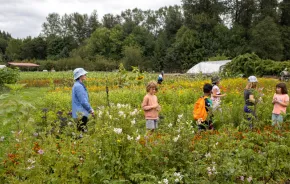Editor's note: This article was sponsored by University Prep.
After a tumultuous year and a half of the pandemic, most students have returned to in-person instruction. While there is widespread agreement among parents, teachers, administrators and health experts that our kids should be back in the classroom, embarking on yet another school year filled with uncertainty is an unsettling prospect for many.
Parents play a critical role in supporting students’ healthy readjustment to “normal” school routines and activities, says Lindsay Metcalfe, a veteran school counselor at University Prep (UPrep), an independent 6–12 school in Northeast Seattle. Students are excited to socialize and return to familiar activities, she says, but socializing and formerly fun activities may not feel as routine or comforting right now as they may have in the past.
ParentMap spoke with Metcalfe to gain her insights into how parents can help our students navigate this school year. Several themes emerged during the conversation, including the value of intentionally rebuilding community, supporting relearning social skills, and attending to our own self-care so we can support our kids.
In your role as a counselor, how are you coaching the faculty to support the students returning to in-school learning?
UPrep has encouraged faculty to really prioritize their own well-being. The message for summer vacation was clear: We want you to rest and recharge. We want you to be okay, so you can be effective and present for your students, regardless of what the coming year brings. Before school started, we talked as a community about anticipating students’ needs and how advisers and teachers can connect with and support students they’re concerned about.
On top of our SEL program, which is already pretty robust, we’re doing specific mental health education and skills [development]. We are teaching students to ask themselves “Why am I feeling the way that I do and what can I do about it?” We want to acknowledge that everyone’s going to go through tough times in their lives and that you need to be equipped with skills to handle those tough times.
Also, COVID-19 safety, mental health and academics are all intertwined. If a child’s mental health is suffering, then they’re not going to be an effective learner. If they’re concerned about COVID-19 transmission, then that’s going to distract them in the classroom. The more that we can do to help students feel safe and as in control of the situation as they can be, the more engaged as learners they’re going to be.
Are students having to relearn socialization skills?
As we brought students back to campus last year, I saw them being so excited to socialize again and to talk with each other. But I also had a lot of kids say to me, “I feel really awkward or rusty, like I forgot how to talk to people.” That’s going to be even more the case for a student who maybe didn’t get to come back to school last year and has been home more. Some of this is accepting that there are going to be little blips. Students are not going to be as a smooth or as confident. Practice is really the key, and it’s almost a “quantity over quality” kind of issue. I encourage students to have little conversations with an increasing number of people as they move through their days. These conversations will start to feel easier with practice.
Our head of school has made it clear that our theme for the school year is rebuilding community. Even though we were fortunate to be together for a few months last spring, I think everybody feels that need and wants to have that emphasis on just connecting again.
I think most students are coming back to school with a healthy dose of self-consciousness — “How are people going to perceive me after this time away?” — and they are trying to manage those worries. Both adults and students are finding it more overstimulating to be in large groups or to talk to a lot of people throughout the day, so they’re being more intentional about recharging. People are proactively taking breaks or finding some quiet time in their day to relax and not have to be “on.”
After a year of less social interaction, how can we be helping our kids polish up their friendship skills?
Students do better if they set their own goals, and parents can ask questions to help their kids engage in this practice. What do you want to be different about your social life? What do you want to have happen over the next week or the next month, and then, how do we operationalize that to get there? While kids crave connection, I’ve found that many of them are feeling more passive, and they want somebody to talk to them and somebody to invite them to hang out. Still, somebody’s got to take that leap and start the interaction. I try to help students by building their confidence with little successes and wins.
Last year, I ran a series of lessons and activities with our sixth graders specifically on how to make friends over Zoom. Once we came back in person, we went back to the basics, talking about nonverbal communication with masks: How do I show somebody that I’m interested in them? How can I communicate with my body language that I am listening and engaged with what they’re saying? Because feeling listened to and like the other person has a genuine interest in what you’re saying is one of the best ways to foster connections. We practiced listening skills and asking an open-ended question to continue the conversation.
Last spring, I asked students to set small incremental goals for their socialization. Can you gradually increase the number of people that you talk to each day? Can you circle back to a conversation with somebody in class and then try and text them that night to just reinforce that connection? The kids were really receptive to this social coaching.
It’s also a good idea to manage expectations around social interaction. It requires time and a certain quantity of conversation with somebody to start feeling like they’re your friend. It can be hard for kids to give that process the time to unfold. Just try to normalize that many people are in the same boat.
How should we be helping kids process the pandemic and what we’re living through?
I think adults have to attempt this process for themselves before we ask our kids to attempt this. As a parent, you want to be a little guarded about the processing that you share with your child, but modeling some of your thinking can be helpful. Saying some of your thoughts out loud can help your child start to think about it themselves.
Ask questions, listen and offer validation: What has been really frustrating about pandemic life for you? What are some unexpected benefits or joys that you discovered? What are some things that have come up over the past year and a half that you want to let go of? What do you want to keep?
This is not one deep conversation — it is a lot of little touchpoints. Model your own thinking, rather than barraging your child with questions — not many kids are going to be excited to be deeply interviewed by their parents! But in a quiet moment, put a question out there. Maybe you won’t get an answer. Allow your child the time and space to let it marinate, and then they might offer you an answer later.
There is an also an opportunity right now for us to think about the concept of “going back to normal.” A lot of folks have started to accept that we might be creating a different normal. If the world is going to be different and our experience of being around other people is going to be different, how do you as an individual want to be different?
Why is self-care for parents even more important during these stressful times?
We live in service of our children so much of the time, and when we’re struggling, it feels wrong to divert our attention inward. But it’s the same for everyone: You can’t take care of other people if you’re not taking care of yourself.
At the beginning of the pandemic, many adults were proactive [about self-care] — going on walks, planting a vegetable garden, cooking and eating healthy. When we entered the languishing phase, many of those good habits went by the wayside. But physical health informs mental health. Folks need to make sure they are getting enough sleep, eating nourishing food, getting some movement in and connecting with people they enjoy spending time with. If those pieces aren’t in place, then all the ice cream and bubble baths in the world are not going to help.
Parents also need to know that they won’t always feel wonderful after they engage in self-care. Sometimes self-care just lightens the amount of blah that we feel. Circle back to that question: What do we want to keep and what do we want to leave behind? We don’t have to go back to all of the things that we used to do.
Maybe the new normal is actually more normal, in terms of balance?
Many families are so much happier being less scheduled. Having your child choose one or two extracurriculars instead of four is going to probably benefit everybody. They’ll be overwhelmed if they try and do all the things they used to do, and parents will be overwhelmed trying to make the logistics happen. Be intentional about how you fill the family schedule.
Also, building in open time to adjust and readjust is important. The pandemic situation is going to keep changing, and our reaction to the situation is going to keep evolving. There were times during the first six months of the pandemic that I felt were like when my kids were babies. As soon as you get one stage figured out, you’re on to the next stage. I do think that we all are going to need to find ways to be flexible over the course of the school year, and if we are totally scheduled, then that flexibility is going to be much harder to maintain.
The worst-case scenario is that you end up with additional free time and I have confidence in our young people to find ways to fill that extra time. Allow space for that processing, for connection with friends, for being able to watch an episode of their favorite show after homework is done. We all need a little bit more downtime: We’re finding that our regular activities take more energy from us, so let’s make sure that we have that time built in to recharge ourselves.
So, do you think the kids are gonna be alright?
Well, I think it might take some time, but yeah, they will.












